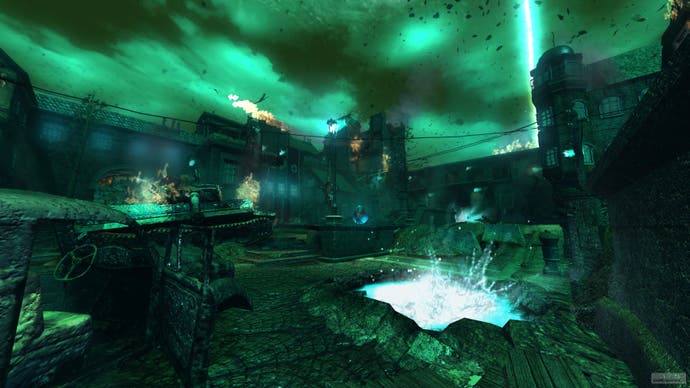John Carmack's QuakeCon Keynote
All the highlights. Voxelising is the future, you know.
On what the PC's still best at
"The PC still has some advantages. It's better at disseminating information over the web. Browsing the web on a console still pretty much sucks. Keyboard/mouse is still the best way to play a first-person shooter. And of course it's funny how we've got a whole generation of people that have grown up on console games like Halo, and they think it's just great, the game controller and all this, but if you ever set up a competitive environment there, of course that's not a pretty situation. But fundamentally it's just better - it's direct positioning, directly correlating motion to something in the game, where it reports some fractional motion.
"And I think that we're going to see some effects - a little more speculatively - with the fact that Quake Live is all centralised with your accounts, with all of your configuration stuff there, you should be able to just jump in and play the game anywhere, at any random computer, in the hotel business centre, some office spot nobody's looking at - it should be quick to just jump in and play the game." [The point being, of course, that even now console service have a single login for all games, you can't turn up at a random 360 in a hotel and continue from your last save point.]
On what he actually does at id
"So my time winds up in little snippets of time - little bit on mobile, little bit on more future-looking research - but 90-plus percent of my time at my desk is working on things that pertain to Rage.
"I do get to choose what I work on - I'm the president of the company, although I usually bill myself as technical director because that's what I do. Todd [Hollenshead, CEO] does the business deals, he's out talking to the publishers most of the time and all that. I'm not even the lead programmer - Robert Duffy manages our herd of programmers now, because I'm an engineer, right? I want to sit there and make things work, I want to build things, and Robert barely gets to spend 25 percent of his time writing any code, because...he commented earlier this year that we now have more programmers at id than we had employees when he started a long time ago, and we're in a very different situation now where managing all of that is a full-time job, just making sure that everyone's working productively on things. There's this old law about people getting promoted past their point of competence, and I'm trying to avoid that by not trying to be a manager and do a poor job of that."
On whether the PC can kill consoles

"There are people that honestly believe the PC will come back and make consoles obsolete. I think that probably is a naive view. I think there are inherent challenges for the PC platform that consoles don't have that I would be surprised to see that desktop PC box making Sony and 360 and Wiis and everything obsolete. I don't think that's going to happen."
On the success of Nintendo Wii
"Of course it's exciting to see how well Nintendo has done, because people were counting them out in the last generation, that they were going to be the next SEGA, and here they go and really kicked everyone's butt in this generation. Nintendo's always been our kind of least-friendly first-party out there, but I cheer success. They went against the conventional wisdom, they did something different and they won big - and that's great to see."
On the length of the console lifecycle
"What happens with all of these vendors on the next generation - the timing of all this - is going to be interesting. We know a little bit more now than we did a year ago, but not a huge amount. I know internally how many steps away the 3D hardware vendors are from where they think they'll be pitching consoles. And honestly it would be great if this generation of consoles lasted twice as long as the last one, if we had a viable eight-year commercial lifespan for this generation of titles, and I know some people are saying this is the plan - I don't think it's going to turn out that way.
"I think it's going to be far too tempting to one-up your competitor because they don't think you're doing this but you really are to get it out earlier and try and get some first-mover advantage. So I don't think it's going to be too long. I hope it's long enough that we're able to have a new project come out at a nice sweet spot for this generation and not when everybody knows what's coming next Christmas."
On id Tech 6 and the future of technology

"I can say with conviction at this point that the next generation games are still going to be predominantly polygon games. Even what we're looking at for id Tech 6 with all of this infinite geometry, voxelising everything, probably recursive automatic geometry generation - all of this is still going to be a hybrid approach. We hope that we can generate these incredible lush environments on there, but the characters are probably still going to be coming in as triangles over a skeleton there. There will be probably be some interesting things tried with completely non-polygonal renderers, but the practical approach with games that look like the games we're doing now but play better probably will still have lots of polygons going on and these chips better be really good at that.
"We talk about where we're going with the technology, how hardware's going to exploit it, what choices the vectors have is a really big interesting thing. And I know I get looked at a lot as an authority here, but the problem is everybody's waving their hands around - nobody has this hardware really to work on. We have some preliminary things. The work that's going on with Cuda is actually what gives NVIDIA a strong lead right now. All the work that's going on with that - they're learning a lot with that and it is influencing their directions, and I'm pretty excited about future generations there. ATI and Apple have their own sort of initiatives. But there's always the 900lb gorilla in the room of Microsoft - what gets laid down as far as DX Compute, how well's that going to work across everybody, does that become the standard that drives all of this?
"That's dangerous, because, again, we don't know. We do not have the experience. With OpenGL and D3D we had the wonderful background done by SGI, all these people who'd gone there and done it. Right now, we have research projects, but nothing resembling a real app as we would look at it as a gaming app, so we don't know what these issues are, and there are billion-dollar bets going on this. I wouldn't want to be in some of those shoes when you don't have all the data that you need. They need to do these research projects across these architectures, and nobody has time to do this."
John Carmack is president, co-founder and technical director of id Software.
